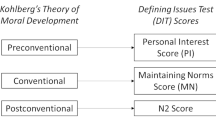Abstract
Both of us have been involved with helping professions, especially new scientific or technological professions, develop ethics programs—for undergraduates, graduates, and practitioners. By “ethics program”, we mean any strategy for teaching ethics, including developing materials. Our purpose here is to generalize from that experience to identify the chief elements needed to get an ethics program started in a new profession. We are focusing on new professions for two reasons. First, all the older professions, both in the US and in most other countries, now have ethics programs of some sort. They do not need our advice to get started. Second, new professions face special problems just because they are new—everything from deciding who belongs to the profession to formalizing ethical standards so that they can be taught. Our purpose in this paper is to generalize from our experience and to identify some of the fundamentals for getting an ethics program started in a new profession. We present our recommendations in the form of response to 6 questions anyone designing an ethics program for a new profession should ask. We realize that our brief discussion does not provide a complete treatment of the subject. Our purpose has been to point in the right direction those considering an ethics program for new profession.
Similar content being viewed by others
References
Anderson, R. E. (1994). The ACM code of ethics: History, process, and implications. In C. Huff & T. Finhold (Eds.), Social issues in computing: Putting computing in its place (pp. 48–62). NY: McGraw-Hill.
Davis, M. (2002). Profession, code, and ethics. Aldershot, England: Ashgage.
Davis, M. (2007). Eighteen rules for writing a code of professional ethics. Science and Engineering Ethics, 13, 171–189.
Davis, M. (2011). A plea for judgment. Science and Engineering Ethics. [Epub ahead of print]. Available from http://www.ncbi.nlm.nih.gov/pubmed/21318325.
Keefer, M. W., & Ashley, K. D. (2001). Case-based approaches to professional ethics: A systematic comparison of students’ and ethicists’ moral reasoning. The Journal of Moral Education, 30(4), 377–398.
Kipnis, K. (1988). Toward a code of ethics for pre-school teachers: The role of the ethics consultant. International Journal of Applied Philosophy, 4, 1–10.
Acknowledgments
A version of this article was presented at the Eighteenth Annual Meeting of the Association for Practical and Professional Ethics, March 5–8, 2009, Cincinnati, Ohio. We should like to thank those present, as well as one reviewer for this journal, for comments. This article relies on work performed under. NSF Grant No. 0019171 NSF Division of Information and Intelligent Systems: Collaborative Research: The Responsible Conduct of Computational Modeling and Research (Keefer, Co-PI); and NSF Grant No. SES-9985813: Ethics Across the Curriculum: Continuing to Transfer the Technology (Davis, PI).
Author information
Authors and Affiliations
Corresponding author
Rights and permissions
About this article
Cite this article
Davis, M., Keefer, M.W. Getting Started: Helping a New Profession Develop an Ethics Program. Sci Eng Ethics 19, 259–264 (2013). https://doi.org/10.1007/s11948-011-9279-x
Received:
Accepted:
Published:
Issue Date:
DOI: https://doi.org/10.1007/s11948-011-9279-x




